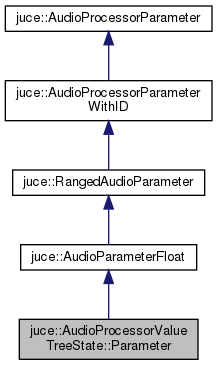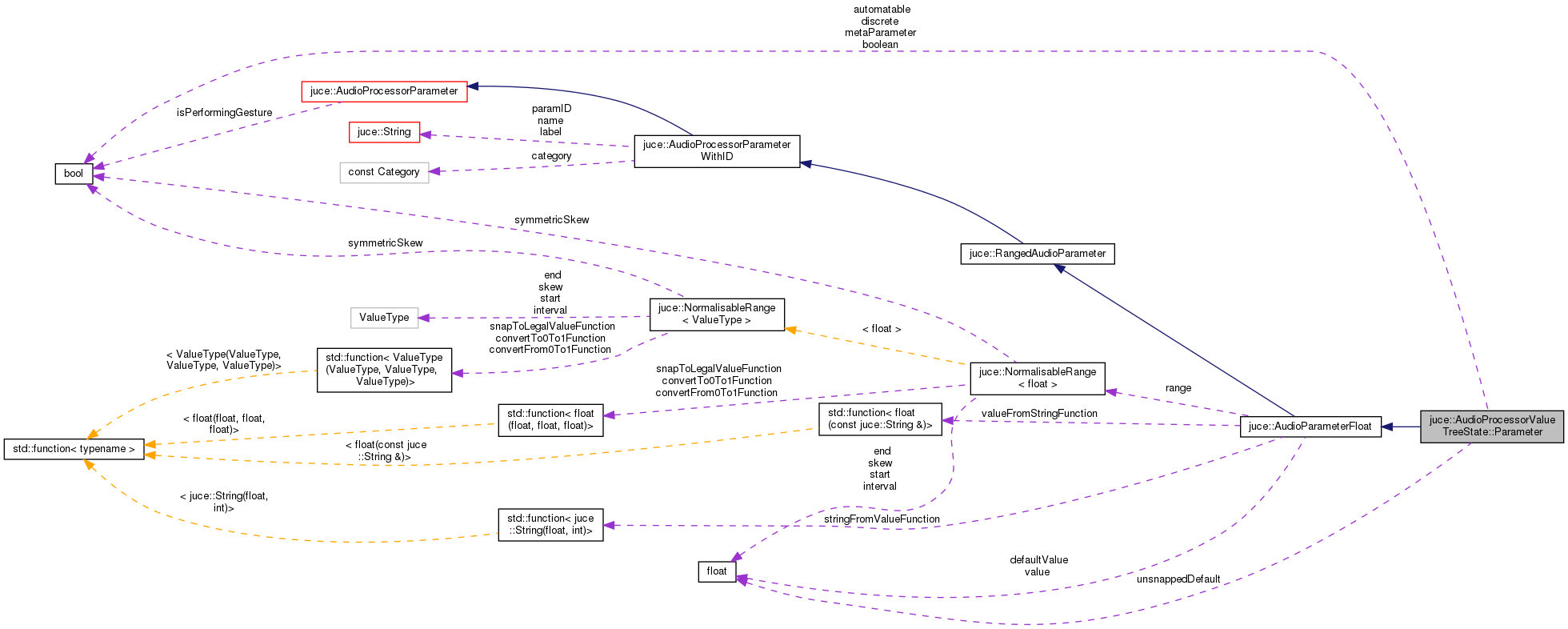|
| | Parameter (const String ¶meterID, const String ¶meterName, const String &labelText, NormalisableRange< float > valueRange, float defaultValue, std::function< String(float)> valueToTextFunction, std::function< float(const String &)> textToValueFunction, bool isMetaParameter=false, bool isAutomatableParameter=true, bool isDiscrete=false, AudioProcessorParameter::Category category=AudioProcessorParameter::genericParameter, bool isBoolean=false) |
| |
| void | addListener (Listener *newListener) |
| | Registers a listener to receive events when the parameter's state changes. More...
|
| |
| void | beginChangeGesture () |
| | Sends a signal to the host to tell it that the user is about to start changing this parameter. More...
|
| |
| float | convertFrom0to1 (float v) const noexcept |
| | Denormalises and snaps a value based on the normalisable range. More...
|
| |
| float | convertTo0to1 (float v) const noexcept |
| | Normalises and snaps a value based on the normalisable range. More...
|
| |
| void | endChangeGesture () |
| | Tells the host that the user has finished changing this parameter. More...
|
| |
| float | get () const noexcept |
| | Returns the parameter's current value. More...
|
| |
| virtual StringArray | getAllValueStrings () const |
| | Returns the set of strings which represent the possible states a parameter can be in. More...
|
| |
| virtual String | getCurrentValueAsText () const |
| | Returns the current value of the parameter as a String. More...
|
| |
| float | getDefaultValue () const override |
| | This should return the default value for this parameter. More...
|
| |
| const NormalisableRange< float > & | getNormalisableRange () const override |
| | Returns the range of values that the parameter can take. More...
|
| |
| int | getNumSteps () const override |
| | Returns the number of steps that this parameter's range should be quantised into. More...
|
| |
| int | getParameterIndex () const noexcept |
| | Returns the index of this parameter in its parent processor's parameter list. More...
|
| |
| bool | isAutomatable () const override |
| | Returns true if the host can automate this parameter. More...
|
| |
| bool | isBoolean () const override |
| | Returns whether the parameter represents a boolean switch, typically with "On" and "Off" states. More...
|
| |
| bool | isDiscrete () const override |
| | Returns whether the parameter uses discrete values, based on the result of getNumSteps, or allows the host to select values continuously. More...
|
| |
| bool | isMetaParameter () const override |
| | Should return true if this parameter is a "meta" parameter. More...
|
| |
| virtual bool | isOrientationInverted () const |
| | This can be overridden to tell the host that this parameter operates in the reverse direction. More...
|
| |
| | operator float () const noexcept |
| | Returns the parameter's current value. More...
|
| |
| void | removeListener (Listener *listener) |
| | Removes a previously registered parameter listener. More...
|
| |
| void | sendValueChangedMessageToListeners (float newValue) |
| |
| void | setValueNotifyingHost (float newValue) |
| | A processor should call this when it needs to change one of its parameters. More...
|
| |
A parameter class that maintains backwards compatibility with deprecated AudioProcessorValueTreeState functionality.
Previous calls to
can be replaced with
using Parameter = AudioProcessorValueTreeState::Parameter;
However, a much better approach is to use the AudioProcessorValueTreeState constructor directly
using Parameter = AudioProcessorValueTreeState::Parameter;
YourAudioProcessor()
: apvts (*this, &
undoManager,
"PARAMETERS", { std::make_unique<Parameter> (paramID1, paramName1, ...),
std::make_unique<Parameter> (paramID2, paramName2, ...),
... })
| int juce::AudioProcessorValueTreeState::Parameter::getNumSteps |
( |
| ) |
const |
|
overridevirtual |
Returns the number of steps that this parameter's range should be quantised into.
If you want a continuous range of values, don't override this method, and allow the default implementation to return AudioProcessor::getDefaultNumParameterSteps().
If your parameter is boolean, then you may want to make this return 2.
The value that is returned may or may not be used, depending on the host. If you want the host to display stepped automation values, rather than a continuous interpolation between successive values, you should override isDiscrete to return true.
- See also
- isDiscrete
Reimplemented from juce::AudioParameterFloat.
| bool juce::AudioProcessorValueTreeState::Parameter::isBoolean |
( |
| ) |
const |
|
overridevirtual |
Returns whether the parameter represents a boolean switch, typically with "On" and "Off" states.
This information may or may not be used, depending on the host. If you want the host to display a switch, rather than a two item dropdown menu, override this method to return true. You also need to override isDiscrete() to return true and getNumSteps() to return 2.
- See also
- isDiscrete getNumSteps
Reimplemented from juce::AudioProcessorParameter.
| bool juce::AudioProcessorValueTreeState::Parameter::isDiscrete |
( |
| ) |
const |
|
overridevirtual |
Returns whether the parameter uses discrete values, based on the result of getNumSteps, or allows the host to select values continuously.
This information may or may not be used, depending on the host. If you want the host to display stepped automation values, rather than a continuous interpolation between successive values, override this method to return true.
- See also
- getNumSteps
Reimplemented from juce::AudioProcessorParameter.
| void juce::AudioProcessorParameter::setValueNotifyingHost |
( |
float |
newValue | ) |
|
|
inherited |
A processor should call this when it needs to change one of its parameters.
This could happen when the editor or some other internal operation changes a parameter. This method will call the setValue() method to change the value, and will then send a message to the host telling it about the change.
Note that to make sure the host correctly handles automation, you should call the beginChangeGesture() and endChangeGesture() methods to tell the host when the user has started and stopped changing the parameter.

